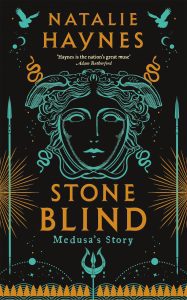A fresh perspective on an old myth
The classic Greek story of Perseus gets given a fresh perspective in Stone Blind, looking on the perspective of the legendary Gorgon Medusa. In the original myth, Perseus’s grandfather forced Perseus out of his kingdom and King Polydectus tasked him to kill and bring back the head of Medusa.
Before Medusa was Perseus’s trophy, she was the mortal Gorgon sister of Sthenno and Euryale. In many parts of the mythology, Medusa was a beautiful maiden who caught the eye of Poseidon, the god of the sea, who seduced her in Athene’s temple. Enraged by this, Athene turned Medusa into the snake-haired figure we know today.
Classicist and comedian Natalie Haynes covers both stories in her fourth novel, Stone Blind. She shines a new light on the plight of Medusa, and raises questions about what makes a monster and what makes a hero. Haynes keeps the story close to Medusa’s Ovid myth in this retelling, as the mortal gorgon sister of Sthenno and Euryale catches the eye of Poseidon, the god of the sea.
After he does something unspeakable to her in Athene’s temple, an angry Athene punishes Medusa by turning her into a monster. She is content to live out her days secluded, but her story becomes entangled with a young Perseus. To protect his mother from a forced marriage, he needs to get the head of a Gorgon.
Although the novel structures itself around the myth of Perseus and Medusa, it also explores the different parts of Greek mythology and the gods. This includes Zeus, Athene, Hera, and Hephaestus, as well as the war between the gods and Gaia’s children. These small pieces of the story weave back into the main plot of Medusa and Perseus, with the novel telling each chapter from the perspective of the women, while men play smaller roles. The novel’s narrative plays an instrumental part in conveying the message behind the book.
Stone Blind isn’t just a book telling the story of a woman who turned into a monster. And as far as the story is concerned, it does not revolve around a young man’s misguided attempts to build his own hero myth either. It shows the effect of male violence (through Zeus, Perseus, and Poseidon), and also highlights the part women play in unknowingly (and knowingly) becoming the antagonist to other women.
This is shown throughout the book from the beginning. For instance, Hera’s attitude towards Zeus’s ex-wife Metis and Perseus’s mother, Danae. Amphitrite knows Poseidon’s intentions toward Medusa, but does not warn her or her sisters. Finally, through the relationship between Andromeda and her mother Cassiope.
However, in some cases, the antagonism isn’t out of malice; there is compassion. Cassiope loves her daughter, Sthenno and Eurytale grow from not knowing how to care for their newborn sister to having an immense amount of love for her. Even the hardened Athene shows compassion. However, there is a lot of complacency and selfishness.
These points of view, at least some of them, are handled with wit, sarcasm, empathy, and humour. It showcases Haynes’ ability to write a strong story that examines these themes while leaving space for the reader to breathe. And the humour was surprisingly good. This book is funny – unexpectedly funny. The Elaia’s annoyance with Poseidon constantly complaining about losing “some minuscule part of the sea to the Gorgons” proclaiming, “What did they do? Drink it?” was cackle worthy. Humour doesn’t overshadow the story, or its message, so there’s a great balance between the two.
There is one problem, though. Since there are so many characters and so many stories, Medusa’s story gets left behind. Her troubles, other than the odd chapter, aren’t really explored. It feels unfinished and uneasy. Like it’s pushing Medusa to the side and her story is no longer her own.
After Athene turns Medusa, it’s a while before you return to her. Instead, it focuses on Athene. In a similar way to Medusa and Perseus, you also follow Athene from birth, all the way through to her coming into power as a goddess and her struggles to fit into the world around her. This isn’t an unwelcome thing though, and it’s enjoyable to read. However, the thought ‘Where is Medusa?’ does pop into your mind from time to time. At least from Athene and other POVs, you get updates on Perseus’s progress!
Overall, Stone Blind is a joy to read. It highlights a lot of topics that we see every day and puts a spotlight on them and just how awful the Greek gods were. This is an excellent introduction to Natalie Haynes as a writer too, and a great retelling based on one of Greek mythology’s most misunderstood characters.
You can check out more of our book reviews here!
-
Verdict - 9/10
9/10

